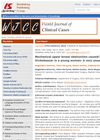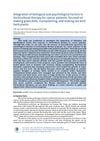 December 2024 in “Nutrients”
December 2024 in “Nutrients” Skin, hair, and nail changes can help detect eating disorders early.
 December 2023 in “Journal of family medicine and primary care”
December 2023 in “Journal of family medicine and primary care” Hair loss in Saudi Arabia causes a low psychosocial impact, with less effect on those without a family history of hair loss.
 July 2023 in “Health science reports”
July 2023 in “Health science reports” Alopecia Areata is linked to a higher risk of several diseases, which vary with age and sex.
[object Object]  42 citations,
July 2015 in “Journal of The American Academy of Dermatology”
42 citations,
July 2015 in “Journal of The American Academy of Dermatology” The conclusion is that oral contraceptives and antiandrogens can treat hirsutism and acne in women with cutaneous hyperandrogenism, but more research is needed for effective treatments, especially for hair loss.
 25 citations,
December 2015 in “Journal of the European Academy of Dermatology and Venereology”
25 citations,
December 2015 in “Journal of the European Academy of Dermatology and Venereology” Alopecia areata significantly lowers quality of life, especially in personal and social areas, and more so if the patient is also depressed.
 45 citations,
March 2015 in “Clinical Endocrinology”
45 citations,
March 2015 in “Clinical Endocrinology” Testosterone therapy is generally safe for transmen, improves sexual function, and has manageable health risks with proper monitoring.
 December 2022 in “Biological and Clinical Sciences Research Journal”
December 2022 in “Biological and Clinical Sciences Research Journal” Early treatment of mixed connective tissue disease is crucial to prevent severe autoimmune conditions.

The document recommends a multidisciplinary approach and experience sharing to advance facial feminization surgery as a medical field.
 2 citations,
July 2023 in “Frontiers in Endocrinology”
2 citations,
July 2023 in “Frontiers in Endocrinology” The review found that current care models for PCOS are not fully effective and more research is needed, especially in low-income countries.
 4 citations,
July 2022 in “Medicina-lithuania”
4 citations,
July 2022 in “Medicina-lithuania” Women with Polycystic Ovary Syndrome (PCOS) often have higher levels of anxiety and depression, especially if they live in rural areas, have less education, don't have children, are over 30, or are obese.
2 citations,
May 2022 in “International journal of trichology” Plica neuropathica is a tangled hair condition that may be caused by hair damage or psychiatric issues and is treated by cutting the hair and addressing mental health.
 2 citations,
December 2021 in “F1000Research”
2 citations,
December 2021 in “F1000Research” Most people in South India lack knowledge about managing COVID-19 at home.
 February 2024 in “World journal of clinical cases”
February 2024 in “World journal of clinical cases” A young woman had surgery to remove a large hairball that blocked her intestines and then got psychiatric help.
 November 2023 in “The journal of investigative dermatology/Journal of investigative dermatology”
November 2023 in “The journal of investigative dermatology/Journal of investigative dermatology” The document concludes that a new questionnaire to assess mental health in alopecia patients shows low rates of seeking mental health services and support groups.
 6 citations,
August 2016 in “Journal of women & aging”
6 citations,
August 2016 in “Journal of women & aging” Older women reported negative physical and psychological effects from Botox and facial fillers, feeling neglected by the medical system.
 August 2022 in “Revista de la Universidad Industrial de Santander/Salud UIS”
August 2022 in “Revista de la Universidad Industrial de Santander/Salud UIS” Stress-related hair loss was reversed with a special medication.
 2 citations,
January 2022 in “Aesthetic surgery journal. Open forum”
2 citations,
January 2022 in “Aesthetic surgery journal. Open forum” Aesthetic surgery can worsen depression and anxiety, especially in those with existing mood issues.
 July 2019 in “Acta horticulturae”
July 2019 in “Acta horticulturae” Horticultural therapy helped cancer patients feel hopeful and positive about their disease experience.
 58 citations,
January 2018 in “International Journal of Women's Dermatology”
58 citations,
January 2018 in “International Journal of Women's Dermatology” Alopecia significantly lowers women's quality of life, with psychological and social challenges, highlighting the importance of early treatment and support.
 February 2024 in “Recima21”
February 2024 in “Recima21” Covid-19 can cause hair loss due to immune and psychological factors.
 10 citations,
July 2021 in “International Journal of Rheumatic Diseases”
10 citations,
July 2021 in “International Journal of Rheumatic Diseases” Lupus patients' body image issues significantly affect their mental health and need more support.
 June 2024 in “British Journal of Dermatology”
June 2024 in “British Journal of Dermatology” Permanent hair loss from chemotherapy significantly impacts patients' mental health and social life, highlighting the need for better patient education and support.
 June 2005 in “British Journal of Dermatology”
June 2005 in “British Journal of Dermatology” Women find hair loss more distressing than men and often underestimate it, needing more public awareness and professional support.
 49 citations,
January 2003 in “American Journal of Clinical Dermatology”
49 citations,
January 2003 in “American Journal of Clinical Dermatology” Effective management of children's hair loss involves accurate diagnosis, various treatments, and supportive care.
22 citations,
December 2011 in “British journal of dermatology/British journal of dermatology, Supplement” Over 40% of women have unwanted facial hair, which can affect their self-image, and should be managed with personalized treatment and support.
[object Object]  3 citations,
May 2010 in “Nursing Standard”
3 citations,
May 2010 in “Nursing Standard” Treatments for autoimmune hair loss have limited success and often relapse, and emotional support is crucial for those affected.
 68 citations,
January 2008 in “Seminars in reproductive medicine”
68 citations,
January 2008 in “Seminars in reproductive medicine” Women with PCOS often feel stigmatized and have mood issues, which can lower their sexual satisfaction, but proper treatment and support can help.
 27 citations,
January 1990 in “Child Psychiatry & Human Development”
27 citations,
January 1990 in “Child Psychiatry & Human Development” The document concludes that supportive home environments and addressing parent-child interactions can effectively treat trichotillomania in children.
 1 citations,
May 2010 in “Nursing Standard”
1 citations,
May 2010 in “Nursing Standard” Treatments for autoimmune hair loss have limited success and patients need emotional support and self-acceptance.
 May 2018 in “Academic Medicine”
May 2018 in “Academic Medicine” Hair loss can cause significant emotional and psychological distress.




























